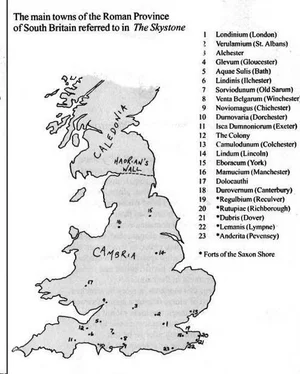No sooner had the peace begun to settle after that exercise than the Hammers went out through all four gates simultaneously, quietly and viciously, thirty men to a group. They stirred up panic on their own, hitting hard and drawing back before any resistance could be organized. An hour later they went out again, through the north gate, in full force. An hour before dawn they went back out again through the same north gate.
By the third night of the siege, the enemy was trying to kill the darkness with bonfires. But there is no wood on the high moors; in order to feed the flames, they had to work hard. We hit them with only one four-group raid from all gates that night, in the dark just before dawn.
Britannicus was banking heavily on the lack of discipline within the enemy ranks. They had numbers, but they had no co-ordinated leadership. No general. No Britannicus. And by the end of the fourth day they were leaving by the hundreds in search of easier targets.
When dawn came on the fifth day, we were alone and victorious on the moor. Thank God we didn't know that morning that we were the only fighting force of our size still active in the entire north of Britain. Britannicus, however, suspected that things elsewhere had gone very badly wrong. His initial suspicion that this incursion might be a long and hard-fought affair proved to be depressingly accurate. On that first evening of the stand-off at our camp, he summoned Luscar, senior clerk of the cohort, and instructed him to keep an accurate record of everything that occurred, and to maintain the record as a daily log from that time on. That turned out to be a command that was easier for poor Luscar to accept than to observe. It took us almost a year to win back to a real Roman fort in Derventio, and we had to fight almost every step of the way. By the time we got there, we had eaten our oxen and our horses. We had one rickety handcart to hold our meagre supplies, and Luscar had used up every available scrap of papyrus in recording our odyssey. He carried hundreds of tightly rolled sheets in the pack on his back as we crossed the countryside haphazardly in a fruitless search for signs of Roman authority. For almost a year we found nothing but ruined and abandoned villages, towns and military installations. The few local people we did see flocked to us in the beginning, thinking we could help them, but eventually, as our appearance degenerated and our condition grew more desperate, they avoided us, running into hiding as we approached.
We were assembling after breaking camp on a hillside, early on a July morning of the following year, when our look-outs sighted a squadron of Roman cavalry in the valley below us.
Of the eleven hundred-odd souls of the Second Millarian Cohort of the Twentieth Legion, three hundred and seventy-one were still alive, and forty-two of those were men we had found, survivors from different units. Besides myself and Britannicus, we had four more officers and twelve centurions.
IV
The cavalry patrol bunched up immediately as the sound of our cheering floated down to them from the hilltop. We saw the pale ovals of their faces peering up at us, and then, to our consternation, they swung their horses around and galloped away in the direction they had come from. Shouts of welcome and happy recognition changed in the men's throats to howls of outrage and disbelief, which lasted until Britannicus had claimed everyone's attention by climbing on to the boulder closest to him and facing them calmly. When the men had grown absolutely still, he spoke, in an almost conversational tone.
"I know you are soldiers." His emphasis produced frowns of confusion on many faces. We waited throughout a long pause as he stared at us before going on. "And you know who you are." He raised one arm and pointed down into the valley that was now empty of life and beginning to fill with the shadows thrown by the strengthening morning sun. "But those men have run for reinforcement. They have run to report the presence of a large band of hostiles and, depending upon how far away their camp is, they will return in strength, deployed for battle, in a matter of hours." He paused again, allowing his silence to register his message, and then his voice grew stronger, and he hammered his words at us as though they were nails.
"When they return, be it in one hour or ten, they will find — and they will see — the soldiers of the Second Cohort of the Twentieth Legion." As his meaning became clear, we began looking at one another, seeing ourselves for the first time as we had doubtless appeared to the patrol below. We saw men who bore little resemblance to Roman soldiers. What remained of our armour was dull, scarred, battered and long unpolished. Our tunics and cloaks were scabrous and tattered. Only our weapons were keen and burnished — our weapons and our Eagles.
One of the men, bolder than his fellows, raised his voice to point out to Britannicus that the riders below must have seen our Eagles, but he was cut short.
"Trooper, " Britannicus snapped, "how many dead Romans have we seen in the past year? How many Eagles do you think might, across this entire country, have been captured by the Celts?" He broadened his address to take in all of us. "What those men down there thought they saw was a rabble of Celtic heathens carrying captured Roman standards... trophies of war! That is what they firmly believe. When they come back, they will find us, and by that time we will have found ourselves. We may not have the finery, the uniforms, or the trappings expected of Roman troops, but by the Living God, we have the pride and the discipline and the dignity to appear as what we are — soldiers of the Empire!" The men agreed with him. I could hear truculence, grievance and angry shame in their murmuring among themselves — feelings that I shared, because I, too, felt demeaned and belittled by this lack of recognition. Britannicus issued his next orders over the murmur of voices, and we moved in response down from our hilltop at the double, and spent the next hour and more in determined ablutions by the stream in the valley. By pooling the bits and pieces of armour that remained in usable condition, we were able to equip almost a full squad of men as recognizable standard-bearers, and these formed a vanguard behind Britannicus, myself and the other officers as the rest of the men assembled in disciplined ranks to await the return of the patrol and the forces they would bring with them.
We did not have long to wait. Only slightly more than an hour after we had taken up our positions at parade rest on the floor of the valley, before we really had time to grow uncomfortable under the strengthening July sunshine, our outposts signalled the approach of the Roman forces. There were two full cohorts, more than a thousand men, in the battle force that came to meet us, and it took almost half an hour for their advance guard to draw close enough to make us out clearly. It quickly became evident that they were surprised by our positioning on the valley floor, and disconcerted by our obvious discipline. That they suspected some kind of elaborate entrapment was also obvious, evidenced by the protracted comings and goings of officers and messengers between the advance guard and the main body of the troops. We could not even put their minds at rest by signalling them with a trumpet, because we had lost our last surviving trumpeter and his instrument in a skirmish two months earlier. I heard Britannicus sucking air between his teeth in an almost silent expression of annoyance at the dithering we were witnessing, but he said nothing and we remained motionless.
Finally, in response to our own lack of activity, a small group of mounted officers, accompanied by a squadron of mounted bowmen, approached us hesitantly and drew up within hailing distance, whence they demanded that we identify ourselves.
Читать дальше









